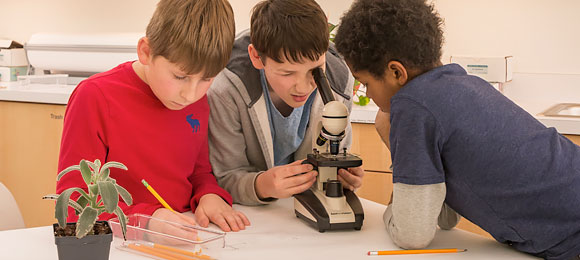
$120 per class
Monday through Friday, seasonally
10 – 11:30 a.m. 90-minute program
Maximum number of students: 30
A 1:7 ratio of chaperones to students is required.
Pondering The Prairie (90 Minutes)
Fall through 10/27, Spring
Students visit the Garden’s Dixon Prairie to study ecosystem conditions, measure diversity, and observe the amazing adaptations of plants that live there. Observations provide students with evidence that specialized plant structures improve the plants’ chances of survival, and that changes to the conditions in an ecosystem may affect the plants.
NGSS: LS2.A, LS4.C, LS4.D
Lake investigations (90 minutes)
Fall, Spring
Students examine water samples from Garden lakes, using observations of biotic and abiotic conditions, chemical tests, and aquatic organisms to determine the lake’s ecological health. As they learn to identify and use aquatic macroinvertebrates as indicators of water quality, they build evidence to prove that changes to the conditions in this ecosystem affect the populations that live there.
NGSS: LS2.A, LS4.C, LS4.D
Ecosystems and plant adaptations (90 Minutes)
Early Spring
Plants have found ways to survive in most of Earth’s challenging environments. Visit gardens that represent different ecosystems to identify relationships between the way plants look and the conditions in each of those environments. Patterns students observe provide evidence that specialized plant structures improve chances of survival in harsh conditions.
NGSS: LS1.A, LS1.C, LS4.C, PS3.D
New DIY Hydroponics (90 MinUTES)
Early Winter, Winter
Students work together to define a problem and design a solution: how to build a plant-growing system without soil. Students build, test, and discuss a hydroponic system using their choice of materials and strategies. Their systems can be used to plan and carry out investigations in the classroom or at home.
Photosynthesis Lab (90 minutes)
Early Winter, Winter, Early Spring
Delve into the process of photosynthesis. Students use scientific equipment to study living plants and answer questions about photosynthesis. Students will then construct an explanation for the role plants play in the cycling of matter and flow of energy through all living things.
NGSS: LS1.A, LS4.C

